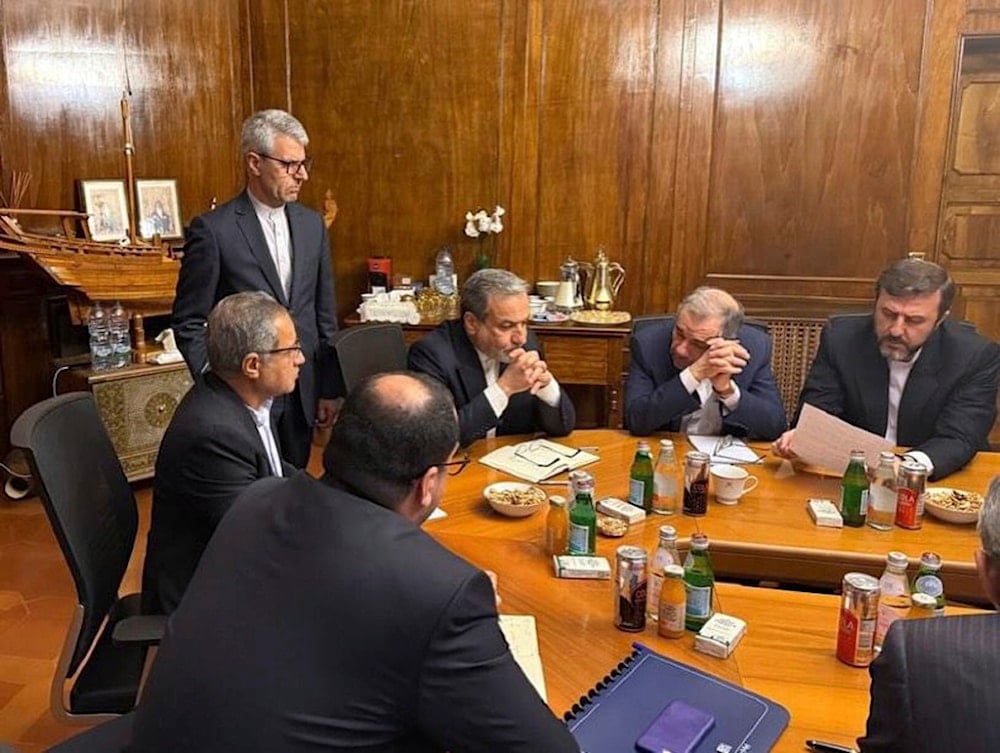Axios claims FM Araghchi proposes interim deal, Tehran denies
US President Trump has given his negotiators a two-month window to reach a deal with Iran and has simultaneously ordered a military buildup in the region should diplomacy fail.
-

In this photo released by telegram messaging app channel of Iranian Foreign Minister Abbas Araghchi, Foreign Minister Abbas Araghchi, third right, attends a meeting with his colleagues during negotiations with U.S. Mideast envoy Steve Witkoff, in Rome, Italy, Saturday, April 19, 2025 (Iranian Foreign Minister Abbas Araghchi Telegram messaging app channel via AP)
Axios on Thursday claimed that Iranian Foreign Minister Abbas Araghchi told US envoy Steve Witkoff that finalizing a comprehensive nuclear deal within US President Trump's 60-day deadline may not be realistic, and suggested the idea of first negotiating an interim arrangement.
The proposal was raised during the recent talks in Rome. However, Iran's Mission to the United Nations denied the report, stating, "This is simply neither true nor accurate." The US State Department declined to comment.
Trump has given his negotiators a two-month window to reach a deal with Iran and has simultaneously ordered a military buildup in the region should diplomacy fail. If no agreement is reached, Trump threatened to authorize a US or Israeli military strike targeting Iranian nuclear facilities.
During the Rome talks, Araghchi reportedly told Witkoff that due to the highly technical nature of a nuclear agreement, it would be challenging to complete all details within 60 days. Witkoff responded that while he was not currently open to an interim deal, both sides could revisit the idea if they agree, closer to the deadline, that more time is necessary.
Despite differing views on timing, both sides appeared to leave the door open to continued progress.
Following the talks, Araghchi said during a trip to Beijing that the two countries had reached a "better understanding about the principles of a possible deal" and that there was "a chance for making progress."
Oman's Foreign Ministry also issued a statement affirming that the parties had agreed to move forward with the next phase of discussions aimed at a "fair, enduring and binding deal which will ensure Iran is completely free of nuclear weapons and sanctions, and maintain its ability to develop peaceful nuclear energy."
On Saturday, US and Iranian technical teams will meet in Oman for the first round of working-level talks focused on the specifics of uranium enrichment and other nuclear constraints. The US delegation will be led by State Department official Michael Anton. Witkoff and Araghchi may also hold a follow-up meeting depending on the outcome of the technical discussions.
Read more: Iran rejects US demand to import enriched uranium amid indirect talks
Meanwhile, International Atomic Energy Agency (IAEA) Director-General Rafael Grossi, who visited Tehran last week, met with Witkoff in Washington on Wednesday. It was their second meeting in under a week. Grossi told reporters, "The talks are serious... we are in a crucial moment," and said the IAEA plans to send a technical team to Tehran to discuss reinstalling surveillance equipment—a move he acknowledged is likely tied to the ongoing talks.
Secretary of State Marco Rubio offered a more cautious view in a recent podcast interview, saying, "We're a long ways away from any sort of agreement with Iran," but added that Trump remains committed to diplomacy: "He would prefer that there not be a need to resort to military force."

 3 Min Read
3 Min Read










